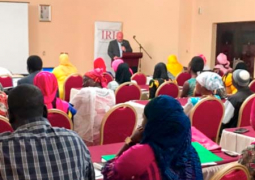Love itself is to be shared as it has many definitions and could be used as it suits one. Love is meant to be the unconditional availability of oneself for the other in kindness, caring, sharing, joy, and all the good that comes with it without condition. We see the love some mothers have for their children, the love some wives have for their husbands and the other way round. Many have loved with lots of conditions either because they expect to reap a gain from the relationship or they would be able to get what they want. The love of God surpasses all these artificial love many engage in. One may ask him or her self, "Is there a string attach to my love for others? Or does it come straight from my heart as God commanded me to do?" The Gospel of John takes an indept dimension of the mutual love that we crave for.
One way of approaching the words of Jesus from the Last Supper Discourse in John read this past Sunday is to consider their relationship to the activities and teaching of Jesus during his ministry. When He spoke of a man showing no greater love than to lay his life for his friends, we recall Jesus as the Good Shepherd who lays down His life for His sheep (10:11). When he claimed to make known what he had heard from the Father, we remember Jesus' role as revealer (). He made his fullest statement of this claim before Annas (-23). When He told His disciples that He had chosen them, not they Him, we recall how he called them at the beginning of the Gospel (-51).
We can also explore parallels elsewhere in the discourse. The mention of the fruit the disciples were to bear returns us to the figure of the vine (15:5). The promise that the Father would give them anything they asked for calls to mind Jesus' insistence that they must let His words find a home in them (15:7). His mention of the joy they would one day experience anticipates His description of joy to come () as well as his meeting with them on Easter Day ().
Sometimes in the Discourse, a key word is repeated again and again. Such a word in Sunday's passage is love. During His ministry, Jesus taught mostly about life (), but once the Supper began, it was love that He emphasized (13:1). We learn how this love is shown by the Father to the Son, how the disciples must not only abide in Jesus, as a branch in the vine, but must also abide in the love of Jesus. Surprisingly, the disciples are not told to love Jesus but keep His commandments. The only commandment found in John is that of mutual love to be limited only by death. Hence, the disciples of Jesus become no longer servants but friends, as Moses had been a friend of God (Ex 33:11). This is what Jesus meant when, at the beginning of the Supper, He washed the feet of the disciples and told them to wash one another's (13:14); they were to love each other as He had loved them.
The love for His disciples, those who were close to his heart were loved and He taught them the love. The disciples shared the love and enforced it in their teaching.
In the words of Fr. Tony Sonko who came to say the Mass at Star of the Sea, were centered on the love for each other and God, the love that had no condition but full of reality. He illustrated the talk on love by telling a live story when he was in School. He says, "When I was at School at
Love is under estimated in many quarters but it needs to be taken seriously. The love God has shown us surpasses all but human beings have not learnt from it. The fact that man longs and seeks for love either from parents, neighbours or counterparts means man has a lot to do with the improvement of their love for the other. Why do those who proclaim to be lovers end up fighting, hating each other and doing the opposite for their one time loved ones? Why do we see the product of love living with one party? Why do we hate what we once cherished as a lover? Why interpret love in the negative way? Why are there no true love but unconditional love? Why love someone who can give you in return? Why do we ignore those we love for a little offence? Those who do not forgive but still say they love the other would also argue out that they are right. Right, has been seen among lovers as a source of controversy that makes lovers jittery about the other. Another of the problem comes from dishonesty that involves jealousy and lies to make others believe what the other is not, under camouflage of the situation.
The love Christ showed man surpasses all the above. In Corinthians, the apostles mentioned that love is patient, kind, just, forgives, cares and more but not many take to the fact. Christ was clear about love as He said, "Love your neighbour as thy self" was stressed for them to pass on the message.
The Gospel of John talks on a lot of the love Christ lavishes on man. Dying on the Cross in atonement of man's sins is an example to note and love others more than we expect without reservation and wait for God's reward.




